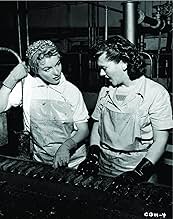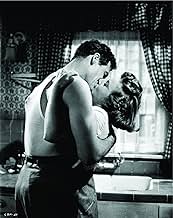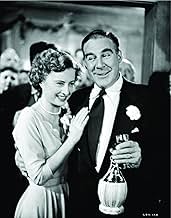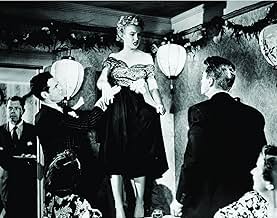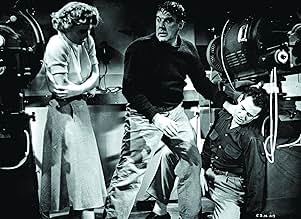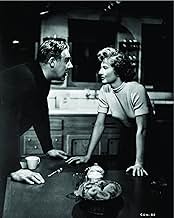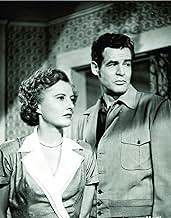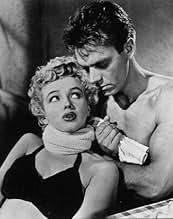Agrega una trama en tu idiomaMae Doyle comes back to her hometown a cynical woman. Her brother Joe fears that his love, fish cannery worker Peggy, may wind up like Mae. Mae marries Jerry and has a baby; she is happy but... Leer todoMae Doyle comes back to her hometown a cynical woman. Her brother Joe fears that his love, fish cannery worker Peggy, may wind up like Mae. Mae marries Jerry and has a baby; she is happy but restless, drawn to Jerry's friend Earl.Mae Doyle comes back to her hometown a cynical woman. Her brother Joe fears that his love, fish cannery worker Peggy, may wind up like Mae. Mae marries Jerry and has a baby; she is happy but restless, drawn to Jerry's friend Earl.
- Waiter
- (sin créditos)
- Restaurant Patron
- (sin créditos)
- Guest
- (sin créditos)
- Restaurant Patron
- (sin créditos)
- Fisherman
- (sin créditos)
- Restaurant Patron
- (sin créditos)
- Guest
- (sin créditos)
- Fisherman
- (sin créditos)
- Fisherman
- (sin créditos)
- Man
- (sin créditos)
- Dirección
- Guionistas
- Todo el elenco y el equipo
- Producción, taquilla y más en IMDbPro
Argumento
¿Sabías que…?
- TriviaThis movie was shot while Barbara Stanwyck was in the process of divorcing Robert Taylor. The movie also features the rising young star Marilyn Monroe. Barbara gives a good performance in one of her most memorable films. Despite her emotional devastation due to the divorce, the crew noted Stanwyck's lack of a diva tantrum. Fritz Lang later said, "She's fantastic, unbelievable, and I liked her tremendously. When Marilyn missed her lines - which she did constantly - Barbara never said a word."
- ErroresDuring the tavern scene, Mae and Jerry watch the moon rise over the ocean. The film takes place in Monterey, California, which is on the West coast, where the moon rises over the hills and sets on the ocean.
- Citas
Peggy: Weren't you ever in love, Mae?
Mae Doyle: Once.
Peggy: Where?
Mae Doyle: Saint Paul. He was big too, like Jerry. I'll say one thing. He knew how to handle women.
Peggy: Is that what you want from a man?
Mae Doyle: Confidence! I want a man to give me confidence. Somebody to fight off the blizzards and floods! Somebody to beat off the world when it tries to swallow you up! Me and my ideas.
- Créditos curiososand introducing Keith Andes
- ConexionesEdited into Les Amoureux du cinéma (1987)
- Bandas sonorasI Hear a Rhapsody
Sung by Tony Martin
Written by George Fragos (uncredited), Jack Baker (uncredited) and Dick Gasparre (uncredited)
In "Clash," the imagery-- contrasting shots of sea, clouds, birds,etc, register his endorsement of the natural order of things as Good. In Metropolis, the natural order of humanity toward others was stamped out by the drive for materialism and industrial supremacy, Evil (historically predicating Nazism), symbolized always by the grinding and spouting machinery. All of the characters are tuned to a high pitch and respond with intensity. Lang's style of directing brought out the extremes -- the fortissimos-- in his actors, no matter whom he cast. Lang must have been an extraordinarily demanding director to elicit such razor-edge performances from his actors.
The fact that all the actors in "Clash" are familiar to us from other films meant Lang had to pit them against each other to an even keener degree. They are all desperate for something, whether they reveal it on the surface or not. For an actress like Stanwyck, this was an easily achieved emotional state, and she had to accept the concept of "aging" in her role. If anything, Lang forced her to keep her hard edges up a bit too much, allowing some softening only in the rather quick ending. This bit of character transformation happens only after she sees the true desperation that she's driven Paul Douglas to in the final scene in the film room.
Ah, yes, the film room. If that isn't an obvious set piece, I don't know what is. Ryan, as the third wheel, runs the projectors. Much of his dialogue is double-edged. And Ryan's character is the most desperate, the least yielding, even to Stanwyck, making his profession as a film projectionist ironic and something artificial, compared to the "natural" metier of Douglas and his father's as fishermen. They draw on the bounty of nature and so symbolize -- purposely and obviously -- pure goodness in human nature. Douglas gives a generous, sweet-tough-guy performance that is Ryan's match. Douglas never guesses what temptation he presents to his wife Stanwyck when he casually invites his best friend to stay with them. This generosity extends in particular to his overlooking faults, whether of his leeching uncle or his friend's sarcstic selfishness.
The role of the father, as a link to the Old Country and its solid gold ways is well-placed. His speech at the wedding puts his character in a nutshell: God made love, God made wine, God made friends, let everyone enjoy them, or some such pithy message. For a filmmaker like Lang, and other transplanted Europeans, the sacrifice of deep roots of their heritage and language could only be compensated for by an equally deep absorption of the customs and values of the New Country. Emigré geniuses like Lang, Wilder, or von Stroheim, never left anything behind, they reabsorbed and refashioned their material through their sharp perception of human nature in this new context. I think that is why we feel this movie to be beyond mere melodrama. I couldn't stop watching it -- the characters caught me in their predicament: they reach a universal dimension in the very simplicity and obviousness of their situations and temptations. Lang's role was to push them to that level recognition in themselves.
Even the seemingly secondary characters like Stanwyck's brother and his girlfriend, the latter played surprisingly and delightfully by a young Marilyn Monroe, give strong performances. Marilyn already shows her subtlety and emotional vulnerability. Her spontaneous response to Stanwyck's return to her brother's apartment at the beginning revealed a genuine charm, and she provided a needed sparkle in this otherwise grim film.
So why see "Clash"? Even a secondary work by a master bears his mark, and to see the mark and its features in the context of film history is still a worthwhile effort.
Of Four ****, three ***.
- gleywong
- 5 dic 2003
- Enlace permanente
Selecciones populares
- How long is Clash by Night?Con tecnología de Alexa
Detalles
Taquilla
- Total a nivel mundial
- USD 62
- Tiempo de ejecución1 hora 45 minutos
- Color
- Relación de aspecto
- 1.37 : 1
Contribuir a esta página



